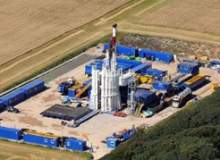
The shale gas debate has once more made headlines, following the release of a report by the UK Department of Energy and Climate Change in April suggesting that it is now safe for energy company Cuadrilla Resources to continue hydraulic fracturing operations in the north-west of England.
It is not known exactly how many shale gas reserves the UK holds. Some studies have suggested that the volume of ‘gas in place’ is near ten trillion cubic feet, while others have claimed to have found 200 trillion cubic feet in Lancashire alone.
The number of offshore reserves has also been estimated, with one recent report stating there may be five times more shale gas in the North Sea than on land.
Guesswork on figures point to small and large reserves, but the question is how much shale gas can be retrieved for the good of energy security and climate change?
It all boils down to economics.
Shale gas: good for energy security?
Shale gas has been something of a game changer in the US market, with reserves expected to account for 49% of total US dry has production by 2035, up from 23% in 2010, according to the Energy Department.
How well do you really know your competitors?
Access the most comprehensive Company Profiles on the market, powered by GlobalData. Save hours of research. Gain competitive edge.

Thank you!
Your download email will arrive shortly
Not ready to buy yet? Download a free sample
We are confident about the unique quality of our Company Profiles. However, we want you to make the most beneficial decision for your business, so we offer a free sample that you can download by submitting the below form
By GlobalDataGas giants, such as Exxon Mobil and Shell, are investing in shale projects in the country which are churning out more than 13 billion cubic feet a day and sustaining thousands of jobs.
The UK may not even come close to this kind of production, but shale gas may be the missing energy link which is required to help put fuel back into the country’s economy.
Joe Howe, director the Centre for Sustainable Development at the University of Central Lancashire believes shale gas is a resource worth investing in, particularly in the north-west of England, because of the long engineering history and experience it has.
"In the north-west we would see ourselves as being the home of manufacturing – we have the nuclear side, we have the aerospace sectors and we have heavy industrial sectors. Shale gas may well provide us with another option to keep those particular skills," said Howe.
"If the UK is serious about engineering, and I believe it should be, then we should be looking to source different options and potentially shale is one of those options. This excites me and I think it’s something that is missing from the current debate around shale gas."
Dr Pierre Noel, director of the EPRG Energy Policy Forum at the University of Cambridge, also believes shale gas is good for energy security and that the UK shouldn’t be afraid of looking to its neighbouring countries for additional reserves.
"In this country, over the past five to seven years, there have been significant concerns about the transition from self sufficiency in natural gas to being a large importer with huge reliance of international gas markets. Those concerns I think are vastly overdone," Noel told delegates at the ‘Hype or Hope? Shale Gas and UK Energy Policy’ event hosted by London-based think tank Policy Exchange in March 2012.
"In a nut shell, the UK is now part of a tightly integrated north-west European gas market, which is one of the largest gas markets in the world."
Managing gas prices
Evidence from the US would suggest that shale gas has had a dramatic impact on the price of electricity and gas. According to IGas CEO Andrew Austin, who also spoke at ‘Hype or Hope’, the production of the unconventional resource has lowered domestic energy bills by more than ten percent.
In Europe, natural gas consumption has been collapsing since 2005 due to high prices, leading industry experts to believe shale gas could also help lower costs in this region.
Howe explained: "At a time when we have seen dramatic hikes in the price of energy – and there are sectors of society who are struggling at the moment, be it the elderly, poor or infirm – I genuinely believe that exploitation of shale gas could reduce the amount of fuel poverty that there is in the UK."
But low gas prices may prove challenging for energy companies wishing to make a profit, and costs need to be fairly high for production to be worthwhile, particularly when it comes to offshore reserves.
Speaking at the UK’s energy and climate change committee in February 2011, Nigel Smith, British Geological Survey subsurface geologist and geophysicist, said: "For the offshore industry to become viable, you’d need vastly higher energy costs, perhaps as high as $200 (per barrel) or more."
Predicting future gas prices, however, is impossible according to Dr Noel: "We simply don’t know what the price of gas will be in 15 years. Whatever number you can read is not worth the paper it’s written on.
"I’ve looked at nearly 30 years of US energy information for the projection of the US price of gas. It’s all over the place, like a plate of spaghetti. When the price is low, the projections are that the price will stay low forever, when the price goes up they move up their projections and when the price collapses, they say ‘oops, our projections were wrong.’"
So what does this mean for the UK? "It means that it would be foolish to have a decarbonisation policy which is just based on cheap gas, but it is also very risky to have a decarbonisation policy which is based on expensive gas to make your subsidised renewables and nuclear look cheap, because this is gambling with energy consumers’ money," Noel explained.
"So you should have a long-term sensible carbon pricing regime that will make people make choices about what they want to do to generate electricity."
Can shale gas replace coal?
It seems that in the US, consumers are making choices – power generation demand is switching from coal to natural gas. But, if shale gas was to replace coal, how will the economy be affected?
Statistics show that gas is about half as carbon intensive as coal when it comes to power generation, but the idea that gas will spontaneously displace coal is not supported by economics, according to Noel.
"In the US, where the price of gas has been going down consistently for three and a half years, what happens is when people start shifting from coal to gas the price of coal goes down, so if you want gas to work towards your climate change targets, you have to make sure that consumers make their choices based on the price of commodity plus carbon, not just commodity," Noel stated.
Greenpeace UK chief scientist Doug Parr agreed that it is not practical to replace coal with gas, but believes that shale gas cannot help the UK meet its climate change targets.
"In the UK specifically, if we just follow the idea that we simply replace coal with gas as the coal stations close, it means that by 2030, our emissions from the UK electricity system would be about 300 grams per kilowatt hour.
"Our current emissions are somewhere around 500, but the government is targeting this to be reduced to 100 grams. So you can see the straight replacement of coal for gas simply doesn’t deliver the impact we need," said Parr.
Hearing from industry experts, it doesn’t seem like shale gas will revolutionise the UK energy market any time soon, but while there is a pressing need to secure energy going forward, this resource could act as a ‘transition’ fuel, bridging the gap between the current high carbon society and a low carbon future.






